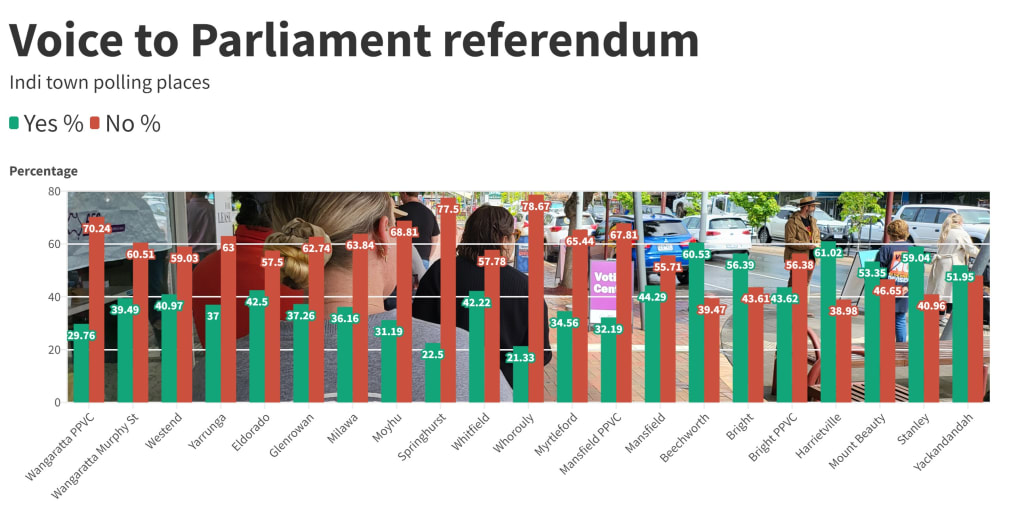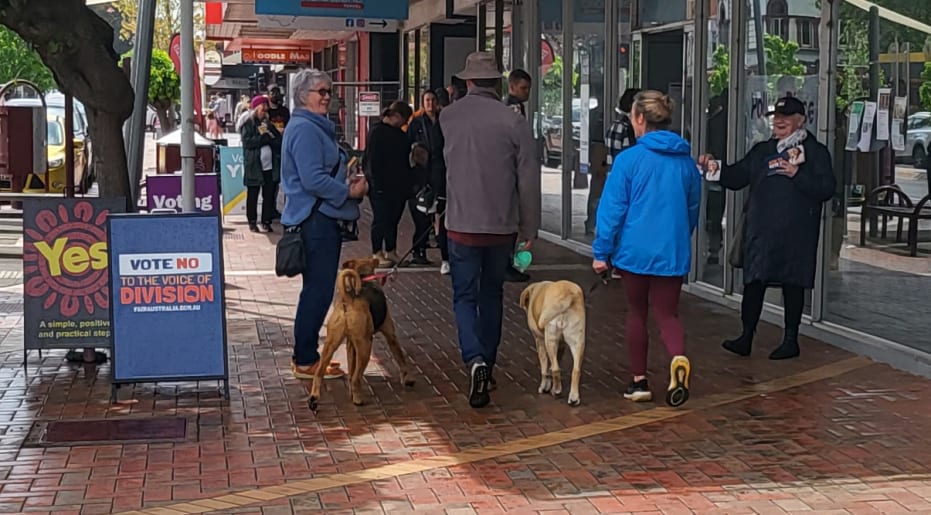INDI voters have given a resounding No to altering the Constitution to establish an Indigenous Voice to Parliament.
Voters were massively against the notion with just 33.2 per cent Yes and 66.8 per cent writing No on their ballot papers, as of Sunday afternoon, with postal votes still being counted.
However, on Referendum Day polling places in Beechworth, Bright, Harrietville, Mount Beauty, Stanley and Yackandandah all had a majority Yes vote.
Out of the 39 Victorian federal electorates, Indi had the fifth highest percentage No vote, with the Mallee at 78.41pc, Nicholls 76.19pc, Gippsland 73.06pc, and Wannon at 68.78pc.
Prepoll voters in Wangaratta submitted a high 10,458 (70.24pc) No vote and 4432 (29.76pc) voted Yes.
Latest Stories
On Referendum Day people who voted at the Murphy Street polling place were 60.51pc No voters, at the Westend it was 59.03pc No and Yarrunga 63pc No.
The average percentage of No voters across the Rural City of Wangaratta's polling places was 65.42pc.
It was well above the figures state-wide, with voters making Victoria the highest proportional Yes vote in Australia compared to other states, with a 45.17pc Yes and a 54.83pc No.
The highest proportions of Yes voters in the Victoria were from Kooyong 59.89, Higgins 60.28, Wills 64.26, McNamara 65.01, Cooper 65.64 and Melbourne 78.04pc.
Independent MP for Indi Helen Haines said change is hard and changing our constitution is exceptionally hard.
"On Saturday, Australians including voters in Indi, comprehensively voted No to recognition in our constitution of Aboriginal and Torres Strait Islander peoples through a Voice to Parliament," Dr Haines said.
"While I am disappointed in the outcome, I am grateful that we have a democracy that allows every one of us to have our say.
"I have always believed that two people of good character can have different views and discuss those views in peace - that is how it should be.
"I am grateful that we have a strong and independent Australian Electoral Commission and I thank them for their fine work.
"I sincerely thank First Nations Australians here in Indi who have opened their hearts, shared their stories and views with me, who have spoken at information sessions, and so much more."
Dr Haines spoke about the additional hardship and weight that Aboriginal and Torres Strait Islander peoples have carried over the past few months during this referendum campaign which she said has taken such courage.
"I thank the many hundreds of people across our community who came along to learn more and who volunteered throughout this referendum," she said.
"I honour the lifetimes of work from Aboriginal and Torres Strait Islander elders and leaders which led to the Uluru Statement from the Heart.
"Many Australians who have been involved in this referendum want to continue walking alongside Aboriginal and Torres Strait Islander Australians and work for a better future."
Dr Haines said the generosity of the Uluru Statement from the Heart means that there are many people who have taken that first step.
"We now need to understand what type of footprint was left, and then, what our next step will be," she said.
"Many people in Australia, no matter how they voted, will be asking 'what next?'.
"For many people, they have been inspired to do more to counter the challenges and discrimination faced by Aboriginal and Torres Strait Islander Australians, or they want to learn more about the traditional owners of the lands where they live and learn much more about more about the history of our nation.
"I know that this is not the end of the journey toward Reconciliation, toward Closing the Gap. We will keep walking together, keeping striving for better.”

















